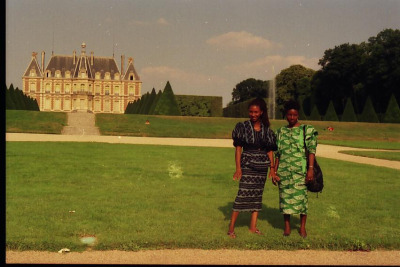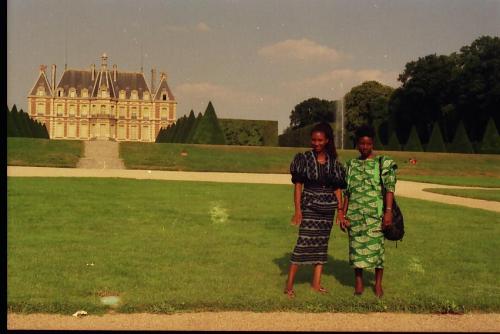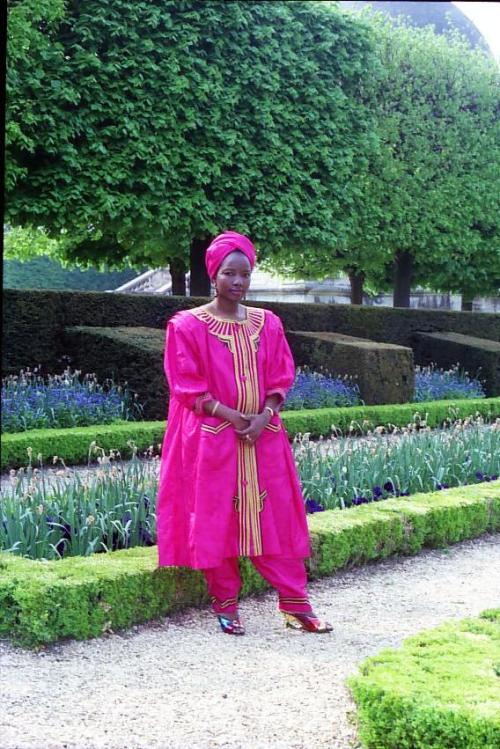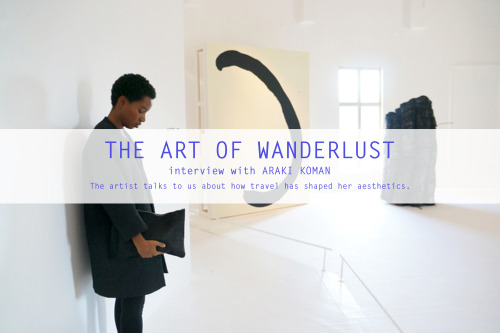#oumxyuki
Who is it ? Nantenin, my mom and her best friend, Kanko.
When and where was this picture taken? Picture taken in 1991 in Paris Suburb (France).
Their story. Guinean women, born in Guinea (in the 60’s), now based in Paris (France) and Toulouse (France) since the 80’s.
What inspires you about their style? The bold shoulders and tight skirts and the use of simple 2-coloured african prints.Submited by Araki, born in France in 1987.
Designers always look to global cultures for inspiration, yet they never pay attention to the actual people. There is such a negative image of migration. But people who have moved places, they can be so open-minded and inspiring. I wanted to pay tribute by focusing on the glamorous side of immigration. - Araki Koman
We interviewed Araki Koman, Guinean Malian French artist and world traveler, about the aesthetics of emigration, mother-daughter connections, and being the odd one out. Read the interview here.
Post link
Nantenin (Paris, 1991)
Submitted by Araki, her daughter, born in France in 1987
Designers always look to global cultures for inspiration, yet they never pay attention to the actual people. There is such a negative image of migration. But people who have moved places, they can be so open-minded and inspiring. I wanted to pay tribute by focusing on the glamorous side of immigration. - Araki Koman
We interviewed Araki Koman, Guinean Malian French artist and world traveler, about the aesthetics of emigration, mother-daughter connections, and being the odd one out. Read the interview here.
Post link
Araki Koman is a Guinean Malian French artist who’s lived in five countries on three continents. It’s no surprise then that her love of global cultures has influenced everything from her artwork to her life choices. While living abroad, she founded OUM x YUKI, an interview-based website about finding yourself through travel. We talk to her about the aesthetics of emigration, mother-daughter connections, and being the odd one out. Photo by Marina Pen.
Tell us about your website OUM x YUKI. What is it all about?
OUM x YUKI is my website about multiculturalism, hybrid identity, and finding yourself through travel. I’ve always been inspired by cultures around the world, even as a child. I remember being four or five, going to Chinatown, and being obsessed with the colors, the smells, the sounds. When I got older I loved finding photos of fashion and aesthetics from all around the world. I was always learning and exploring.
Now I’ve lived in the UK, Denmark, Iceland, Canada, and China, and I’ve realized how travel can open your mind. All the people I’ve talked to through the website, whether they’re immigrants now or have traveled to different countries, have all had deep experiences that are difficult to describe. It becomes part of you. OUM x YUKI is a place where people can share those experiences and others can connect with them.
How did it all start?
I started it when I was in London in 2011, but it has evolved over time. I was working as a graphic designer, but I can never do just one thing, so I started selling clothes that I had from all my travels at a market. The vibe was inspired by my mom’s style when she arrived in France: a little funky and a little traditional at the same time. I decorated my stall with pictures of visual anthropology from around the world. I called the store OUM x YUKI.
The website took its current form when I was in Iceland, right after London. Living there, I connected with my parents’ immigrant experiences more than I ever had. I realized just how courageous they were. I wanted to pay tribute by focusing on the glamorous side of immigration. My website, like my clothing stall, reinterpreted earlier generations’ aesthetics with a modern eye.

Araki’s mom in France.

Araki’s mom and friend in France.

Araki’s mom in France.
It’s interesting that you connect family history and fashion. The usual trend is to focus on what’s up-and-coming. People rarely connect present with past.
Yes, designers always look to global cultures for inspiration, yet they never pay attention to the actual people. There is such a negative image of migration. But people who have moved places, they can be so open-minded and inspiring. There can be so much to learn and share from earlier generations.
The name OUM x YUKI reflects that mother-daughter connection. The “OUM” represents the mother, honoring women from older generations, especially moms who immigrate. It comes from Oum Kalthoum and Oumou Sangaré. Oum Kalthmou was a mid-century Egyptian singer who united the Middle East around her music. I liked her aesthetic. She was very traditional but also avant-garde. Oumou Sangaré is a Malian singer. She does traditionally Malian music, but she’s known around the world.
YUKI represents the daughter, the child of immigrants, the modern perspective. It comes from Yukimi Nagano from the band Little Dragon. She’s Japanese and American Swedish. Combined, OUM x YUKI represents the connection between old and new, Western and non-Western.
You’ve lived in a lot of different countries yourself. How did the experiences compare?
Well the big difference for me is between the societies that are homogeneous and the ones that are multicultural. In multicultural places with a history of immigration, like Bristol, Montreal, and London, it’s easy to adapt. Living in London was especially liberating for me. There are no boundaries; even in the mixing aesthetics: people dress up just to go buy bread and they mix things in such interesting ways. It’s very inspiring.
Societies that are more homogenous are different. In Denmark, a man in the supermarket tried to introduce me to his wife just because she was from Kenya. In China especially I had a bad experience. I was just a Black person to them. When they saw me they would have one reaction, and then they realized I was French and acted differently. It was the first time I realized I was Black. For a while after that I was like, okay that’s it. I don’t like Asia anymore.
I’ve done a lot of introspection in those situations. Because from when I was a child I’ve always been like, “I’m not black, I’m Araki!” I was never really into my parents’ culture growing up, and I don’t think about my color constantly. It’s not a big part of my perspective.

Drawing by Araki.

Drawing by Araki.

Drawing by Araki.
It’s interesting that you’re interested in other cultures, but don’t feel that connected to your own. Why do you think that is?
I don’t know, my curiosity about other cultures just comes naturally. Ever since I was little, I loved learning about other cultures and meeting people from other places. Growing up, people always thought it was weird. My family isn’t super traditional or religious, and people in school would always ask me why I wasn’t practicing or why I ate pork. It was so irritating to me. I was just doing what I wanted to do.
But I never tried to fit in. I just wanted to connect with people who were more open-minded. Thanks to the Internet, I didn’t feel so lonely. It was a way to get the courage to keep being myself. You find people who are like you, who have been there before and have moved forward. Even with OUM x YUKI, I continue to meet new people who are open-minded and inspiring.
How is it being back in France after living so many places?
It’s different. In France there’s social pressure to follow a certain path, and even if you have achievements in another area, it’s not enough. Experiences abroad are not taken seriously. It’s very frustrating, because I feel I’ve lived so many deep experiences and people aren’t even interested. They’ll be like, “Oh sorry, you don’t fit in the box.”
That’s why I’m still considering leaving. I feel freer in places where there are less boundaries. I also love Japan. I’ve loved it since I was 13, and when I visited a few years ago I had this déjà vu kind of feeling. I love the philosophy, the humbleness, wabi sabi aesthetics, the textiles, the food. I would love to go back for longer.
How are your values reflected in your art?
A love for cultures is in my subconscious, and it naturally comes to everything I do. When I draw and collage, I take inspiration form visual anthropology, like styles and spiritual symbols that occur around the world. I mix everything into one drawing. So maybe the girl I’m drawing will have a tattoo from North Africa and a haircut from Peru. I always just want to open people’s minds. We all have more in common than you think. ✰
See more at confluxmagazine.com
Post link



